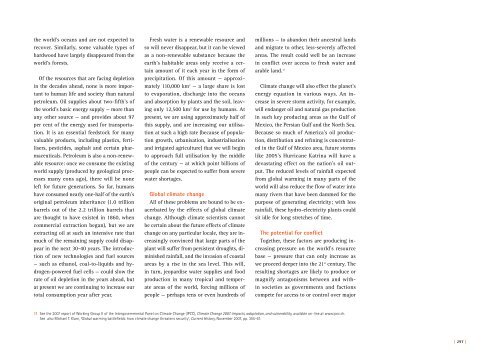RESOURCE COMPETITION IN THE 21ST CENTURY
RESOURCE COMPETITION IN THE 21ST CENTURY
RESOURCE COMPETITION IN THE 21ST CENTURY
Create successful ePaper yourself
Turn your PDF publications into a flip-book with our unique Google optimized e-Paper software.
the world’s oceans and are not expected torecover. Similarly, some valuable types ofhardwood have largely disappeared from theworld’s forests.Of the resources that are facing depletionin the decades ahead, none is more importantto human life and society than naturalpetroleum. Oil supplies about two-fifth’s ofthe world’s basic energy supply — more thanany other source — and provides about 97per cent of the energy used for transportation.It is an essential feedstock for manyvaluable products, including plastics, fertilisers,pesticides, asphalt and certain pharmaceuticals.Petroleum is also a non-renewableresource: once we consume the existingworld supply (produced by geological processesmany eons ago), there will be noneleft for future generations. So far, humanshave consumed nearly one-half of the earth’soriginal petroleum inheritance (1.0 trillionbarrels out of the 2.2 trillion barrels thatare thought to have existed in 1860, whencommercial extraction began), but we areextracting oil at such an intensive rate thatmuch of the remaining supply could disappearin the next 30-40 years. The introductionof new technologies and fuel sources— such as ethanol, coal-to-liquids and hydrogen-poweredfuel cells — could slow therate of oil depletion in the years ahead, butat present we are continuing to increase ourtotal consumption year after year.Fresh water is a renewable resource andso will never disappear, but it can be viewedas a non-renewable substance because theearth’s habitable areas only receive a certainamount of it each year in the form ofprecipitation. Of this amount — approximately110,000 km 3 — a large share is lostto evaporation, discharge into the oceansand absorption by plants and the soil, leavingonly 12,500 km 3 for use by humans. Atpresent, we are using approximately half ofthis supply, and are increasing our utilisationat such a high rate (because of populationgrowth, urbanisation, industrialisationand irrigated agriculture) that we will beginto approach full utilisation by the middleof the century — at which point billions ofpeople can be expected to suffer from severewater shortages.Global climate changeAll of these problems are bound to be exacerbatedby the effects of global climatechange. Although climate scientists cannotbe certain about the future effects of climatechange on any particular locale, they are increasinglyconvinced that large parts of theplant will suffer from persistent droughts, diminishedrainfall, and the invasion of coastalareas by a rise in the sea level. This will,in turn, jeopardise water supplies and foodproduction in many tropical and temperateareas of the world, forcing millions ofpeople — perhaps tens or even hundreds ofmillions — to abandon their ancestral landsand migrate to other, less-severely affectedareas. The result could well be an increasein conflict over access to fresh water andarable land. 11Climate change will also effect the planet’senergy equation in various ways. An increasein severe storm activity, for example,will endanger oil and natural gas productionin such key producing areas as the Gulf ofMexico, the Persian Gulf and the North Sea.Because so much of America’s oil production,distribution and refining is concentratedin the Gulf of Mexico area, future stormslike 2005’s Hurricane Katrina will have adevastating effect on the nation’s oil output.The reduced levels of rainfall expectedfrom global warming in many parts of theworld will also reduce the flow of water intomany rivers that have been dammed for thepurpose of generating electricity; with lessrainfall, these hydro-electricity plants couldsit idle for long stretches of time.The potential for conflictTogether, these factors are producing increasingpressure on the world’s resourcebase — pressure that can only increase aswe proceed deeper into the 21 st century. Theresulting shortages are likely to produce ormagnify antagonisms between and withinsocieties as governments and factionscompete for access to or control over major11 See the 2007 report of Working Group II of the Intergovernmental Panel on Climate Change (IPCC), Climate Change 2007: Impacts, adaptation, and vulnerability, available on-line at www.ipcc.ch.See also Michael T. Klare, ‘Global warming battlefields: how climate change threatens security’, Current History, November 2007, pp. 355-61.[ 297 ]
















